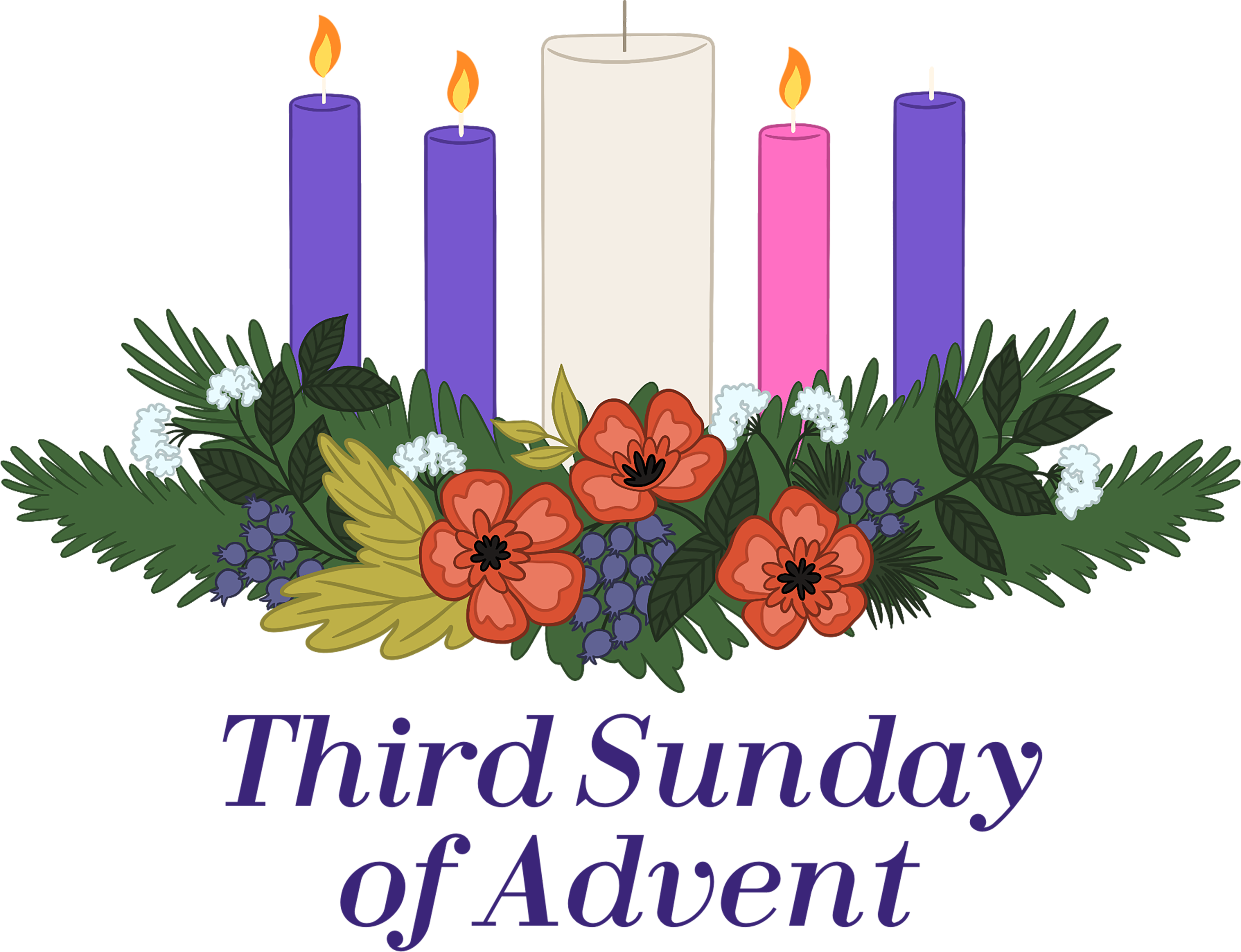Opening Prayer:
Loving God, thank you for your presence here with us this day. Thank you that before time began You were singing over us.
You welcome us, accept and love us in every season of life. Thank you for this Advent season of preparation and waiting.
Help us to open our hearts to you this day,
Help us to bring our whole, unfiltered, honest selves before you now.
Amen.
From prayers prepared by the Church of Scotland’s Mission Support Programme Group for Sunday 15 December 2024 Third Sunday of Advent – Year C. Accessed at: https://www.churchofscotland.org.uk/worship/weekly-worship/monthly/2024-december/sunday-15-december-2024-third-sunday-of-advent-year-c
STF 182 – On Jordan’s bank the Baptist’s cry
On Jordan’s bank the Baptist’s cry
announces that the Lord is nigh;
awake and hearken, for he brings
glad tidings from the King of kings!
Then cleansed be every life from sin;
make straight the way for God within,
and let us all our hearts prepare
for Christ to come and enter there.
For you are our salvation, Lord,
our refuge, and our great reward;
without your grace we waste away
like flowers that wither and decay.
To heal the sick stretch out your hand,
and bid the fallen sinner stand;
shine forth, and let your light restore
earth’s own true loveliness once more.
To God the Son all glory be
whose advent sets his people free,
whom, with the Father, we adore,
and Holy Spirit, evermore.
John Chandler (1806-1876)
Bible Reading
Luke 3:7-18
John said to the crowds that came out to be baptized by him, ‘You brood of vipers! Who warned you to flee from the wrath to come? Bear fruits worthy of repentance. Do not begin to say to yourselves, “We have Abraham as our ancestor”; for I tell you, God is able from these stones to raise up children to Abraham. Even now the axe is lying at the root of the trees; every tree therefore that does not bear good fruit is cut down and thrown into the fire.’
And the crowds asked him, ‘What then should we do?’ In reply he said to them, ‘Whoever has two coats must share with anyone who has none; and whoever has food must do likewise.’ Even tax-collectors came to be baptized, and they asked him, ‘Teacher, what should we do?’ He said to them, ‘Collect no more than the amount prescribed for you.’ Soldiers also asked him, ‘And we, what should we do?’ He said to them, ‘Do not extort money from anyone by threats or false accusation, and be satisfied with your wages.’
As the people were filled with expectation, and all were questioning in their hearts concerning John, whether he might be the Messiah, John answered all of them by saying, ‘I baptize you with water; but one who is more powerful than I is coming; I am not worthy to untie the thong of his sandals. He will baptize you with the Holy Spirit and fire. His winnowing-fork is in his hand, to clear his threshing-floor and to gather the wheat into his granary; but the chaff he will burn with unquenchable fire.’
So, with many other exhortations, he proclaimed the good news to the people.
Time to reflect:
On the third Sunday in Advent, we focus on this passage which outlines John the Baptist’s ministry of proclaiming the good news of the Kingdom of God. The passage begins with John encouraging his listeners to “Bear fruits worthy of repentance” and not to rely on their Abrahamic heritage (Luke 3:8). John then issues a series of metaphors which emphasise the urgency of his message and in the action which his listeners need to take.
In response to the question from the crowd “What should we do?” (Luke 3:10) John offers practical advice for the crowd and specifically advises the tax collectors and soldiers who are asking him the same question. His advice is based around the sharing of clothing and food with those who have none (Luke 3:11) that tax collectors should only collect what is prescribed (Luke 3:13) and for soldiers not to extort money by threats or false accusations but to instead be satisfied with their wages (Luke 3:14).
John makes clear in his responses that an allegiance to God, and alignment with Kingdom values, involves practical steps in which our inward devotion to God is reflected in our outward practices in everyday life. John’s advice is based around ethical and moral action towards the poor and the vulnerable, which reflects the concerns of the Hebrew prophets who sought to emphasise this on God’s behalf. We can therefore see that the good news that John is sharing has particular relevance to these groups. His preaching in the desert is a reminder, to those willing to listen, of what God’s priorities are and how we should be aligned with them.
John makes it clear that repentance is not just about how we feel but how we behave and act. It involves making decisions that have practical and measurable outcomes which demonstrate that we are living faithful lives with changed priorities that align more closely with God concerns and purposes.
In the final section of the passage John makes it clear to his audience that he is not the coming messiah but that the one who baptises with “fire and the Holy Spirit” was on his way (Luke 3:16). Here John is referring to the coming of Christ Jesus, who in the next chapter will be publicly affirmed by God as his beloved Son at his baptism (Luke 3:21-22).
The whole urgency of John’s message is based around the imminent coming of the messiah. For early Christians this urgency was reflected in a similar outlook which sought to emphasise the imminent return of Christ. This urgency may seem somewhat alien to us today. However, the need for the world to be transformed by an outpouring of divine love in Christ, shown in changed priorities, is as relevant today as it was 2000 years ago.
In this Advent and Christmas season Northampton Methodist Church and Circuit has been offering a small group study based around the Holy Habits materials and specifically those on ‘making more disciples’. Holy Habits seeks to look at the early Church in Acts 2:42-47 and encourages us to develop the way of life formed by the first generations of Christian disciples. Just as John, and then Jesus, encouraged people to repent and change their priorities Holy Habits intends to help us to align our priorities with those of God’s Kingdom shown through the Word.
As we journey through Advent and into Christmas, I encourage you to consider how you might welcome the coming of Christ into your hearts and minds this festive season. In what ways could we change our priorities to reflect God’s concerns and how might we practically demonstrate the love of God in our everyday lives as we welcome him?
Prayers of intercession
You are invited to pray silently for:
The needs of the world…
The Church and its calling…
Loved ones going through difficult times…
For peace, justice, and reconciliation…
In Jesus name.
Amen.
The Lord's Prayer
Please use the version that you prefer
Our Father, who art in heaven,
hallowed be thy Name,
thy kingdom come,
thy will be done,
on earth as it is in heaven.
Give us this day our daily bread.
And forgive us our trespasses,
as we forgive those who trespass against us.
And lead us not into temptation,
but deliver us from evil.
For thine is the kingdom,
the power, and the glory,
for ever and ever.
Amen.
Our Father in heaven,
Hallowed be your name,
Your kingdom come,
Your will be done,
On earth as in heaven.
Give us today our daily bread.
Forgive us our sins
As we forgive those who sin against us.
Save us from the time of trial
And deliver us from evil.
For the kingdom, the power
and the glory are yours
Now and for ever.
Amen.
StF 172 – Hills of the north rejoice
Hills of the north, rejoice,
river and mountain-spring,
hark to the advent voice;
valley and lowland, sing.
Christ comes in righteousness and love,
he brings salvation from above.
Isles of the southern seas,
sing to the listening earth;
carry on every breeze
hope of a world’s new birth:
in Christ shall all be made anew;
his word is sure, his promise true.
Lands of the east, arise!
He is your brightest morn
greet him with joyous eyes,
let praise his path adorn:
your seers have longed to know their Lord;
to you he comes, the final Word.
Shores of the utmost west,
lands of the setting sun,
welcome the heavenly guest
in whom the dawn has come:
he brings a never-ending light,
who triumphed o’er our darkest night.
Shout, as you journey on;
songs be in every mouth!
Lo, from the north they come,
from east and west and south:
in Jesus all shall find their rest,
in him the universe be blest.
Charles Ernest Oakley (1832-1865) and Editors of English Praise
Final Prayer
God for whom we wait and watch,
you sent your servant John the Baptist
to prepare your people for the coming of the Messiah. Inspire the ministers and stewards of your truth to turn our disobedient hearts to you; that, when Christ shall come again in glory to be our judge, we may stand with confidence before him, who is alive and reigns with you, in the unity of the Holy Spirit, one God, world without end.
Amen.
The Collect for the Third Sunday of Advent in the Methodist Worship Book © 1999 Methodist Publishing House. p. 524.


